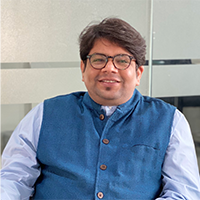
Founder Friendly Money

Rohan Rehani
When Rohan Rehani, co-founder Moonshine Meadeary, was on national TV participating in the popular TV series Shark Tank, it created little ripples of excitement within the TiE community. Rohan was a TiE Nurture mentee and was considered good enough to get an offer of funding. Rohan however declined the offer.
Says Rohan, “we valued our company as Rs. 160 Cr and the Sharks offered us Rs 40 Cr. They under balled our valuation by Rs. 120 Cr, which was not acceptable to us”. Would have been depressing, but as he puts it, “we got 15 minutes of free advertising for our brand. We quite accepted that it would not work out.” So the fall out of fundraising was free publicity. Rohan now waits to see how the ‘shark’ exposure will add to his sales.
Valuation – That’s the crux of any fund-raising situation. The start-up founder thinks his valuation is correct; the money bags think theirs is, and the deal never takes place. Moreover, in the early stages of a start-up company’s life, valuation itself is difficult, as any founder will tell. And then comes the due diligence. As Vikas Kumar, TiE CM puts it, “due diligence is not just a time-consuming affair, but also costs a considerable amount. For an early-stage start-up, even a few lakhs can add up.”
In 2013, Silicon Valley-based aggregator Y Combinator introduced Safe Notes, which are founder-friendly, and do away with the valuation ball game. Safe note is a legally binding promise to allow an investor to purchase a specified number of shares for an agreed-upon price at some point in the future. In 2019, 100X VC brought the iSafe note, which is a faithful copy of its Silicon Valley cousin.
iSafe Note stands for India Simple Agreement for Future Equity. An investor makes a cash investment in return for a convertible instrument. No, it is not a debt instrument (though a 0.0001% non-cumulative dividend is payable to comply with Indian laws) but a founder-friendly convertible security note that benefits both the start-up and the investor. To comply with Indian laws, the iSafe note takes the form of a Compulsorily Convertible Preference Share (CCPS) which is convertible on the occurrence of specific events.
In the two and a half years since iSafe has been an option, we ask our TiE Pune members if this could be an option they would choose:

Sarang Kamalakar
Sarang Kamalakar, Founder, Parentheses Systems:
“My company is a deep tech company and even if the revenues now may not be large, as we do initial trials for our customers, they will grow exponentially soon. For example, we have signed up with a company that has 400 machines in 1 unit and has 6 such manufacturing units. While we start with 50 machines initially, we will in a short span of time grow to 2000 units, and the revenues will grow exponentially. If I do my valuation now, my revenues will tell a different story, and that may impact the money I can raise. So, I will choose the iSafe path. Surely, it is an easier, more founder-friendly and faster way to raise funds.

Ashutosh Saitwal
Ashutosh Saitwal, founder, KlearStack:
Well, I didn’t use safe notes for funding simply because my investors and I were on the same plane regarding our valuation, so there was no need to keep valuation out of the deal. I think iSafe Notes are useful only if you are not sure of your valuation or if you are early stage. We were bootstrapped for quite some time before we got funds.

Dr. Milind Choudhari
Dr. Milind Choudhari, co-founder, WeInnovate Bio Solutions P Ltd:
Personally, I think equity funding has more advantages, simply because you are more disciplined when you have a VC on board. Moreover, a VC investor can connect you to people who can help you with your product, marketing and so on. In general, the VC money comes with network, mentoring Gyan that can put you on the fast track to growth.

Dr. Donald Harris
Dr. Donald Harris, founder, Superclan Prodigies P Ltd:
We are at pre-revenue stage and are planning to raise funds. Since we use AI tools intensively, we need funds to build our MVP. But we are at pre-revenue stage, so I think Safe notes will be most suited to our needs.

Mrudul Palvankar
Mrudul Palvankar, founder, CNATIVES:
We haven’t raised funds yet and don’t plan to do so in the near future. And no, I haven’t heard of Safe notes. But when we plan on fundraising, let’s see.

Niharika Kolte
Niharika Kolte: founder, Volar Alta:
So far, we have managed with Govt. grants and foreign institutional grants. But yes, I am also evaluating CCPS and Safe notes. I think it’s a good idea for early-stage start-ups when you don’t know what to value your business on. When the need arises, we shall see how this suits us.

Prasad Deshpande
Prasad Deshpande, co-founder, UP-TIX:
We have done a small round from friends and family and plan to go to investors, but I’d rather choose safe notes. I think it is important to get funds based on the requirement of my business rather than get into the valuation discussion. That saves time, money, in due diligence and is fast. At a later date, when we are ready to get into the valuation game, we can go the VC route.
Contact us if you have a story to tell: rashmi.ghosh@tiepune.org

